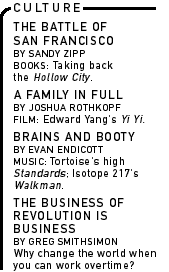|
A corporate makeover threatens to turn StreetWise, Chicago's
homeless newspaper, from a forum for local news and homeless advocacy
into a watered-down, advertiser-friendly entertainment guide that
many believe would undermine the organization's founding principles.
StreetWise was created in 1992 with the mission to "empower
men and women who are homeless" and to help them "help themselves
through the opportunities to earn a living and gain valuable job
skills." The weekly paper's circulation of nearly 25,000 is the
result of sales by its 270 vendors throughout Chicago. Vendors--identifiable
by their official badges--buy the paper for 35 cents and then sell
it on street corners for $1, earning an average of $400 a month.
The income helps them buy meals and get off the streets.
The paper has addressed poverty issues by casting a critical eye
on, among other
 |
|
Vendor Trot McCollough sells
issues of StreetWise.
WALTER KALE/CHICAGO TRIBUNE/KRT2
|
things, corporate greed, such as articles criticizing Nike for its
use of sweatshop labor. The organization also runs a Work Empowerment
Center designed to teach homeless people job and computer skills to
help them find employment.
But executive director Anthony Oliver wants to take StreetWise
in a different direction. He plans to form corporate partnerships
and soften the editorial content because anti- corporate stories
could discourage potential investors. In a press sheet promoting
his "Socially Responsible Advertising" program, Oliver encourages
advertisers to appeal to the "emotional edge" of consumers and use
the paper "to publicize your company's philanthropic support of
community organizations."
Oliver also plans to hang a video billboard outside of the StreetWise
building to run the ads. Some staffers question the financial ethics
of embarking on such an expensive new program for an already financially
strapped organization. (Oliver could not be reached for comment.)
Associate editor Kari Lydersen (who is a frequent contributor to
In These Times) says that Oliver's advertising-driven vision
for StreetWise will hurt the very people the organization
is there to help: the vendors. "It's symbolic of a general shift
away from the newspaper and direct empowerment of vendors," she
says. "More and more, vendors are seen only as a sales force."
According to editor Charity Crouse (who also has written for this
magazine), Oliver's plan is a "180-degree turn" from what the editorial
staff has tried to accomplish in the past two years. "We wanted
to focus the paper as a journalistic news source," Crouse says,
"to give the vendors a business product to sell, rather than just
marketing the image of homelessness. To empower them rather than
make them out to be victims."
The future of the vendors isn't the only thing in jeopardy. According
to statements operations director Dianne Kenner made at a recent
management meeting, Lydersen and commentary editor John Wilson (another
In These Times contributor) will be "phased out" for being
potential liabilities. Kenner has accused Lydersen and Wilson of
"corporate bashing," even though stories she considered potentially
libelous were well-documented.
The latest conflict between Oliver and the staff began on January
8, when former Editor-in-Chief Jalyne Strong filed a grievance with
the board of directors against Oliver. Four days later, Oliver fired
her. Then on February 5, nearly the entire staff sent a letter to
the board accusing Oliver of exploitive labor practices, poor management
and misappropriation of funds, and asking the Board to investigate.
Among the grievances listed are inadequate heating and lighting
for cashiers, an inequitable distribution of pay and benefits for
entry-level employees, and questionable use of grant money intended
for the organization's Work Empowerment Center.
In the following days, Crouse and production chief Allan Gomez
were ordered to leave, Lydersen was fired and Wilson told not to
come in. Oliver flew in former editor John Ellis from California
to put out the paper. But when Ellis realized he could not do so
without a staff, Kenner called the "fired" employees and told them
to report to work the next morning. They agreed, even though their
concerns had yet to be addressed.
According to Wilson, Ellis told the staff that Oliver would have
no contact with them and Crouse would have control of the editorial
content. But later that night, Oliver replaced a staff-written editorial
addressing the conflict with one of his own on an unrelated topic.
In a letter to the board, Wilson said that restrictions on editorial
autonomy were now worse than ever.
About 100 people gathered outside the StreetWise building
on February 13--while a board meeting was taking place inside--to
rally in support of the staff. A week later, the board issued a
letter of response, citing a lack of communication as the main issue,
defending the current management-heavy structure of the organization,
and pledging they were working hard to fix the situation.
But Lydersen says the board's response is little more than a "band-aid
solution" to fundamental problems: "The broken bathrooms and bad
morale are merely symptoms of extensive labor, ethical and financial
problems at the paper."
In the wake of the recent turmoil, the board of directors has appointed
Kenner as editor-in-chief, despite her lack of experience in journalism.
Kenner and Oliver now have final say over the paper's content. Board
president Pam McElvaine told Crouse that StreetWise is not
a regular newspaper, but a nonprofit organization, so it operates
under a different set of rules.
Crouse sees the recent events as all part of the re-emphasis of
the organization, and a sad shift away from its mission. "The priority
is not the vendor, but the funder. It's no longer about maintaining
the self-sufficiency of the individual vendor, but rather appealing
to the philanthropic needs of the advertisers." 
|





